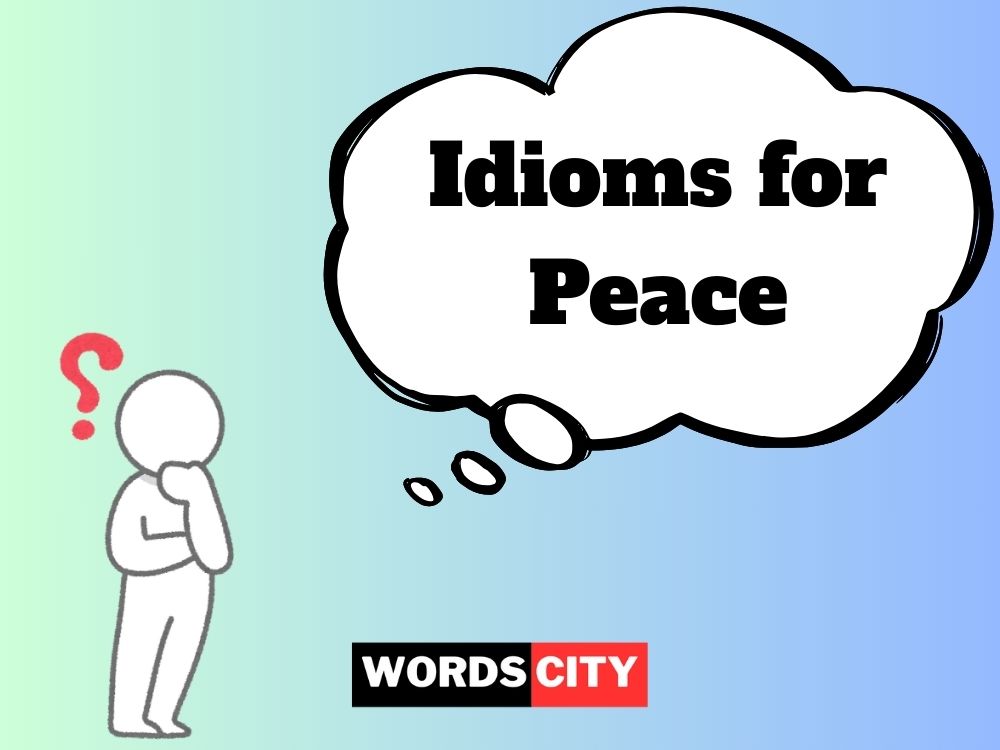Idioms add color, rhythm, and cultural flavor to our everyday conversations. They help us say more with fewer words and express ideas with creativity and impact. When it comes to talking about peace—whether it’s inner calm, harmony in relationships, or world peace—idioms offer a beautiful way to speak from the heart using familiar phrases that carry deep meaning.
Peace-related idioms are more than just fancy expressions—they reflect how we navigate tension, avoid conflict, and promote understanding in our daily lives. They teach us how to stay calm in chaos, how to mend broken bonds, and how to encourage kindness in a world that often feels noisy and fast-paced.
In this blog post, you’ll explore 43 idioms all related to peace. For each one, you’ll learn what it means, see how to use it in a sentence, and find other ways to say the same thing. These idioms can help you sound more natural in English, whether you’re writing, speaking, or just trying to make sense of conversations around you. Let’s begin this peaceful journey into language!
Idioms for Peace
1. Bury the hatchet
Meaning: To end a conflict or make peace after a disagreement.
In a Sentence: After years of not speaking, the two brothers decided to bury the hatchet and start fresh.
Other Ways to Say: Make up, Reconcile
2. Keep the peace
Meaning: To maintain calm and prevent arguments or fights.
In a Sentence: The teacher stepped in quickly to keep the peace between the arguing students.
Other Ways to Say: Avoid conflict, Maintain harmony
3. Make peace with
Meaning: To accept a difficult situation or to resolve a conflict with someone.
In a Sentence: She finally made peace with her past and moved forward with her life.
Other Ways to Say: Come to terms with, Reconcile with
4. Hold your fire
Meaning: To stop or avoid attacking, especially in a tense situation.
In a Sentence: Instead of arguing, he decided to hold his fire and listen to what she had to say.
Other Ways to Say: Stay calm, Don’t retaliate
5. Let bygones be bygones
Meaning: To forget past disagreements and forgive someone.
In a Sentence: We had our differences, but it’s time to let bygones be bygones and move on.
Other Ways to Say: Forgive and forget, Move forward
6. Keep a low profile
Meaning: To avoid attracting attention, especially during a tense time.
In a Sentence: After the disagreement at work, she kept a low profile to avoid further conflict.
Other Ways to Say: Stay quiet, Avoid attention
7. Calm before the storm
Meaning: A peaceful time just before chaos or trouble begins.
In a Sentence: The house was quiet this morning—it felt like the calm before the storm of our family reunion.
Other Ways to Say: Temporary peace, Brief stillness
8. Smooth things over
Meaning: To fix or reduce the intensity of a disagreement or conflict.
In a Sentence: He tried to smooth things over with his friend after their big argument.
Other Ways to Say: Patch things up, Ease tensions
9. Peace of mind
Meaning: A feeling of being calm, safe, or free from worry.
In a Sentence: Knowing that my family is safe gives me peace of mind no matter what happens.
Other Ways to Say: Mental calm, Inner comfort
10. On good terms
Meaning: To have a friendly or peaceful relationship.
In a Sentence: Even after the breakup, they remained on good terms and still talked occasionally.
Other Ways to Say: Friendly, No hard feelings
11. Mend fences
Meaning: To repair a broken relationship or resolve past disagreements.
In a Sentence: After months of avoiding each other due to a misunderstanding, they finally sat down, had a heartfelt conversation, and made a sincere effort to mend fences.
Other Ways to Say: Restore harmony, Fix a relationship
12. Keep things civil
Meaning: To behave politely and respectfully, especially during conflict or disagreement.
In a Sentence: Even though their opinions clashed during the debate, they managed to keep things civil and continued the discussion with mutual respect.
Other Ways to Say: Stay polite, Remain respectful
13. Clear the air
Meaning: To discuss and resolve tension or confusion in a relationship.
In a Sentence: We had a serious talk to clear the air after weeks of awkward silence and confusion between us.
Other Ways to Say: Talk it out, Resolve tension
14. Keep a cool head
Meaning: To stay calm and composed in a stressful or heated situation.
In a Sentence: While everyone else was panicking during the emergency, she kept a cool head and calmly guided everyone to safety.
Other Ways to Say: Stay calm, Remain composed
15. Quiet as a mouse
Meaning: Extremely quiet and calm, especially in a situation that demands silence or discretion.
In a Sentence: The children sat quiet as a mouse during the ceremony, sensing the importance of the moment.
Other Ways to Say: Very silent, Completely still
16. Live and let live
Meaning: To accept that people may live differently and to allow them to do so without interference.
In a Sentence: He believes in the philosophy of live and let live, never judging others for their choices and simply focusing on his own path.
Other Ways to Say: Be tolerant, Respect others’ differences
17. Walk on eggshells
Meaning: To act very carefully to avoid upsetting someone or making a tense situation worse.
In a Sentence: Ever since their disagreement last week, I’ve been walking on eggshells around her to avoid another argument.
Other Ways to Say: Be cautious, Tread carefully
18. Go with the flow
Meaning: To accept things as they happen and not resist changes or challenges.
In a Sentence: Instead of stressing over the last-minute changes, he decided to go with the flow and enjoy the trip as it came.
Other Ways to Say: Adapt easily, Take things as they come
19. Rise above it
Meaning: To not let negative behavior or conflict bring you down or cause you to retaliate.
In a Sentence: Even though they were spreading rumors about her, she chose to rise above it and not let their negativity ruin her day.
Other Ways to Say: Stay mature, Don’t stoop to their level
20. Turn the other cheek
Meaning: To respond to an offense or attack with calmness and forgiveness instead of revenge.
In a Sentence: When he was insulted in front of the group, he simply turned the other cheek and responded with kindness, refusing to engage in an argument.
Other Ways to Say: Forgive, Don’t retaliate
21. Pour oil on troubled waters
Meaning: To do or say something that calms down a tense or difficult situation.
In a Sentence: Seeing that the argument was getting heated, she stepped in and gently poured oil on troubled waters by reminding everyone of their shared goals.
Other Ways to Say: Calm things down, Ease tension
22. Make amends
Meaning: To do something to show you’re sorry and to fix the damage caused by your actions.
In a Sentence: Realizing how much she had hurt him with her words, she made a genuine effort to make amends by apologizing and changing her behavior.
Other Ways to Say: Apologize sincerely, Repair the damage
23. Let it slide
Meaning: To overlook a mistake or offense without making a fuss.
In a Sentence: Although he forgot to return the book, I decided to let it slide because I knew it wasn’t intentional.
Other Ways to Say: Ignore it, Don’t make a big deal
24. In one ear and out the other
Meaning: To not take offense at something said, letting it pass without reaction.
In a Sentence: When they teased her for being quiet, she let it go in one ear and out the other, choosing peace over conflict.
Other Ways to Say: Brush it off, Don’t take it personally
25. A soft answer turns away wrath
Meaning: Responding gently to anger can prevent further conflict.
In a Sentence: Instead of yelling back, she responded with a calm voice, knowing that a soft answer turns away wrath and avoids a full-blown argument.
Other Ways to Say: Respond kindly, Stay gentle
26. Keep your nose out of it
Meaning: To not interfere in someone else’s personal matters or conflicts.
In a Sentence: I knew it wasn’t my business, so I kept my nose out of it and let them handle the issue on their own terms.
Other Ways to Say: Mind your business, Don’t get involved
27. Like water off a duck’s back
Meaning: When criticism or unkind words don’t affect someone at all.
In a Sentence: Even with all the rude comments, he stayed calm—everything rolled off him like water off a duck’s back.
Other Ways to Say: Unbothered, Doesn’t take it personally
28. Quiet the storm
Meaning: To settle a conflict or calm a chaotic situation.
In a Sentence: Her comforting words helped quiet the storm in the room after the heated discussion turned emotional.
Other Ways to Say: Soothe emotions, Defuse the conflict
29. Patch things up
Meaning: To repair a broken relationship or fix a disagreement.
In a Sentence: They had a long talk over coffee and finally patched things up after weeks of cold silence.
Other Ways to Say: Reconnect, Heal the rift
30. Peace talks
Meaning: Formal or informal discussions aimed at ending conflict or restoring harmony.
In a Sentence: After months of tension, the two groups sat down for peace talks to find common ground and reach an agreement.
Other Ways to Say: Negotiations, Discussions for harmony
31. Calm as a cucumber
Meaning: Extremely calm and relaxed, even in a stressful situation.
In a Sentence: While everyone around her was panicking before the big performance, she remained calm as a cucumber and took the stage with confidence.
Other Ways to Say: Completely relaxed, Unshaken
32. Sit on the fence
Meaning: To avoid taking sides in a conflict or making a firm decision.
In a Sentence: He sat on the fence during their debate, not wanting to offend either friend by picking a side.
Other Ways to Say: Stay neutral, Avoid commitment
33. Extending an olive branch
Meaning: Offering peace or trying to end a disagreement by being the first to make a kind gesture.
In a Sentence: After weeks of silence, she extended an olive branch by sending a thoughtful message to say she missed their friendship.
Other Ways to Say: Offer peace, Reach out kindly
34. Hush things up
Meaning: To keep a conflict or mistake quiet to avoid embarrassment or further trouble.
In a Sentence: Instead of making a scene about the mix-up, they decided to hush things up and handle it privately.
Other Ways to Say: Keep it quiet, Avoid attention
35. Take the high road
Meaning: To behave morally and respectfully, especially when others are not.
In a Sentence: Even though he was insulted publicly, he took the high road and responded with grace and maturity.
Other Ways to Say: Be the bigger person, Act with dignity
36. Calm the waters
Meaning: To make a situation less tense or to settle strong emotions.
In a Sentence: Her soothing words and steady tone helped calm the waters when the meeting became unexpectedly heated.
Other Ways to Say: Ease the tension, Restore calm
37. White flag
Meaning: A symbol of surrender or a desire for peace.
In a Sentence: Tired of arguing all night, he waved the white flag and asked if they could just talk things out calmly.
Other Ways to Say: Surrender, Admit defeat peacefully
38. Let someone off the hook
Meaning: To forgive someone or release them from responsibility or punishment.
In a Sentence: Even though she forgot their anniversary, he let her off the hook and chose to focus on enjoying the rest of their evening together.
Other Ways to Say: Forgive, Excuse the mistake
39. All is forgiven
Meaning: Everything is forgotten and peace has been restored.
In a Sentence: After they exchanged apologies and shared a laugh, it was clear that all was forgiven between them.
Other Ways to Say: We’re good now, It’s over and done
40. A heart of gold
Meaning: A kind and peaceful nature, always wishing good for others.
In a Sentence: She has a heart of gold, always ready to comfort a friend or make someone feel better after a hard day.
Other Ways to Say: Very kind, Full of compassion
41. Cool as ice
Meaning: Extremely calm and composed, even in intense or difficult situations.
In a Sentence: When the team was losing and everyone was panicking, the captain remained cool as ice and motivated them to stay focused.
Other Ways to Say: Emotionally steady, Unflustered
42. Sweep it under the rug
Meaning: To ignore or hide a problem instead of dealing with it openly.
In a Sentence: Rather than discussing the issue, they chose to sweep it under the rug and pretend nothing had happened.
Other Ways to Say: Avoid the problem, Hide the issue
43. Bridge the gap
Meaning: To reduce differences between people or groups and create understanding.
In a Sentence: Their project aimed to bridge the gap between different communities by encouraging open dialogue and peaceful collaboration.
Other Ways to Say: Connect people, Build understanding
Exercise to Practice
Fill in the blanks:
- After weeks of not talking, they finally decided to _______ the hatchet and be friends again.
- She stayed _______ as a cucumber while everyone else was freaking out about the exam.
- His calm voice helped _______ the waters during the tense family dinner.
- They agreed to _______ bygones be bygones and stop fighting over something so small.
- The teacher told us to _______ a cool head during the emergency drill.
- The kind message was her way of _______ an olive branch and showing she wanted peace.
- He _______ the gap between two teams by helping them find a shared goal.
- When the argument started, I chose to _______ the high road and stay silent.
- She didn’t scold me for the mistake; she just let me _______ the hook this time.
- Rather than solve the issue, they decided to _______ it under the rug.
- He had a heart of _______, always helping others without expecting anything back.
- Instead of responding with anger, she simply turned the other _______ and walked away.
Answers:
bury, calm, calm, let, keep, extend, bridged, take, off, sweep, gold, cheek
Conclusion
Peace idioms not only make our language more vivid but also reflect the values we hold when it comes to handling conflict, maintaining harmony, and showing kindness. Whether you’re trying to repair a friendship, stay calm under pressure, or simply bring more positivity into your life, these idioms give you the words to express peaceful intentions clearly and gracefully.
By using these 43 idioms in your conversations, writing, and daily reflections, you’re not just improving your vocabulary—you’re also practicing patience, empathy, and communication. Language is a bridge to understanding, and idioms are the colorful bricks that help us build it. So go ahead, spread a little peace, and let your words bring people closer.




